


FRIEDRICH WILHELM AUGUST FROEBEL
1782 -
(G3a, G3b, G3c, G4, W4, Va)
xxxxxThe German pioneer in
education, Friedrich Froebel, found his vocation when he went to
work at a Frankfurt school which based its teaching on the
progressive lines put forward by the Swiss educator Johann
Pestalozzi. Inspired by this advanced learning method, he worked
with Pestalozzi at his boarding school in Yverdon from 1806 to 1810
and then, after an enforced period of military service, opened his
“Universal German Educational Institute” at Griesheim in 1816,
moving it to Keilhau two years later. There his school quickly
gained a reputation for its teaching methods, based on the theory
that self-
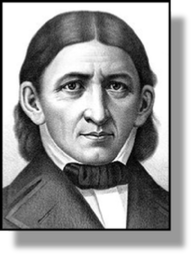 xxxxxFriedrich Froebel was one of the world’s greatest
contributors to child education. A disciple of the Swiss reformer
Johann Pestalozzi, he believed that children should be encouraged to
learn in a happy environment wherein activity and play stimulated
natural development. He is particularly remembered for his
introduction of the kindergarten, a pre-
xxxxxFriedrich Froebel was one of the world’s greatest
contributors to child education. A disciple of the Swiss reformer
Johann Pestalozzi, he believed that children should be encouraged to
learn in a happy environment wherein activity and play stimulated
natural development. He is particularly remembered for his
introduction of the kindergarten, a pre-
xxxxxFroebel was born at Oberweissbach in Thuringia, then in Saxony, the son of a clergyman and one of five children. His early childhood was not a particularly happy one. His mother died when he was only nine months old, and his father appears to have given him little personal attention. He was eventually brought up by an uncle. At school he showed a particular interest in botany and the love of nature, and on completing his somewhat limited education, attended informal classes at Jena University. He then tried his hand at various jobs, including forestry and architecture, before going to teach in a school at Frankfurt. There he found his true vocation. Teaching methods at this school were based on the progressive lines put forward by the Swiss education reformer Johann Pestalozzi, and Froebel quickly came to appreciate their value. Indeed, such was his interest in these methods that two years later he went to visit Pestalozzi at his boarding school at Yverdon in Switzerland. He worked and studied there from 1806 to 1810.
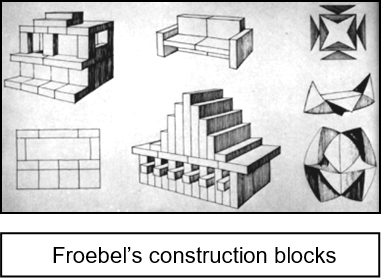 xxxxxInspired by what he saw at Yverdon, but convinced that
improvements could be made, he entered the University of Gottingen
in 1811. There, unfortunately, his studies were cut short by an
enforced period of military service in the Prussian army, then
engaged in the Napoleonic Wars. However, during this military
interlude he made a number of converts to his own teaching methods,
and from 1816 two of them worked with him in what he called his
“Universal German Educational Institute”. This special school was
established at Griesheim and then, two years later, moved to
Keilhau, near Rudolstadt, also in his home state of Thuringia. It
was at Keilhau especially that he was able to put his ideas into
practice, creating in a comparatively short time an institution with
a growing reputation for its advanced ideas on child education. Many
teachers visited this school to see at first hand the relaxed
atmosphere, the lack of unnecessary restraint, and the importance
placed upon self-
xxxxxInspired by what he saw at Yverdon, but convinced that
improvements could be made, he entered the University of Gottingen
in 1811. There, unfortunately, his studies were cut short by an
enforced period of military service in the Prussian army, then
engaged in the Napoleonic Wars. However, during this military
interlude he made a number of converts to his own teaching methods,
and from 1816 two of them worked with him in what he called his
“Universal German Educational Institute”. This special school was
established at Griesheim and then, two years later, moved to
Keilhau, near Rudolstadt, also in his home state of Thuringia. It
was at Keilhau especially that he was able to put his ideas into
practice, creating in a comparatively short time an institution with
a growing reputation for its advanced ideas on child education. Many
teachers visited this school to see at first hand the relaxed
atmosphere, the lack of unnecessary restraint, and the importance
placed upon self-
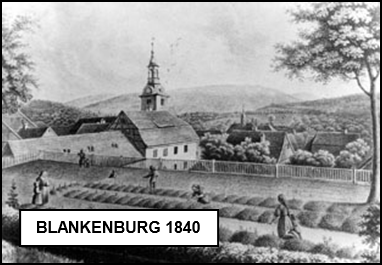 xxxxxIn 1831, at the invitation of the Swiss government, he
took on the task of training elementary school teachers, working out
of an orphan asylum at Burgdorf. When he returned to Keilhau in 1837, he took advantage of this experience and
opened up his revolutionary Kindergarten (Children’s Garden) in Blankenburg (illustrated), again in
Thuringia. This infant school, designed for children from three to
seven years, was well ahead of its time, placing emphasis upon
learning activity, and stressing the importance of play in a child’s
development. And with this system went the need for what he called
“gifts”, a variety of games, toys and stories to encourage
experiment and stimulate interest. Among these was his own highly
successful collection of Mother-
xxxxxIn 1831, at the invitation of the Swiss government, he
took on the task of training elementary school teachers, working out
of an orphan asylum at Burgdorf. When he returned to Keilhau in 1837, he took advantage of this experience and
opened up his revolutionary Kindergarten (Children’s Garden) in Blankenburg (illustrated), again in
Thuringia. This infant school, designed for children from three to
seven years, was well ahead of its time, placing emphasis upon
learning activity, and stressing the importance of play in a child’s
development. And with this system went the need for what he called
“gifts”, a variety of games, toys and stories to encourage
experiment and stimulate interest. Among these was his own highly
successful collection of Mother-
xxxxxUnfortunately, Froebel’s
ideas were too novel to be fully appreciated in their day, and
financially he found it difficult to keep the school running.
Furthermore, the name Froebel became associated with the socialist
and radical views of Froebel’s nephew Julius Froebel, a professor at
Zurich. As a consequence, the Prussian government, fearing that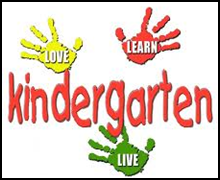 kindergartens were being used for subversive purposes, closed all of
them down in 1851. The ban was not lifted until nine years later,
well after Froebel’s death. Nevertheless, the idea of the
kindergarten caught on, and many such schools were soon in operation
across Europe. Later the movement spread across the entire world,
and proved particularly popular in the United States.
kindergartens were being used for subversive purposes, closed all of
them down in 1851. The ban was not lifted until nine years later,
well after Froebel’s death. Nevertheless, the idea of the
kindergarten caught on, and many such schools were soon in operation
across Europe. Later the movement spread across the entire world,
and proved particularly popular in the United States.
xxxxxApart from Pestalozzi,
Froebel’s ideas on education were influenced by the works of the
French social reformer Jean Jacques Rousseau, and by those of the
German philosophers Johann Gottlieb Fichte and Friedrich Wilhelm
Schelling. A deeply devout man, his emphasis upon the natural growth
of a child was religiously motivated. His theories, including as
they did the development of co-
xxxxxAsxnoted
earlier, the Froebelian movement proved particularly popular in the
United States. The American educator Elizabeth Palmer Peabody (1804-
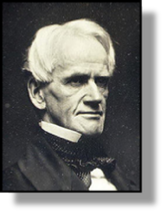
xxxxxAndxanother
educator well worthy of mention at this time was her brother-
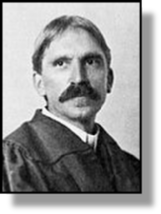
xxxxxLaterxin
the century came another outstanding educator, the American
philosopher John Dewey
(1859-
xxxxxIncidentally,
John Dewey is not to be confused with Melvil Dewey (1851-
Acknowledgement
Froebel:
lithograph, artist unknown, published by the American educator
Charles William Bardeen, (1847-
W4-


